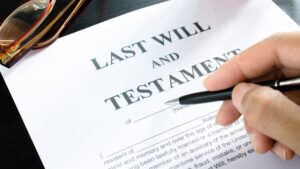
There is a lot of misinformation about what happens if you don’t have a will when you die. Contrary to popular belief, your property rarely passes to the state if you die without a will. Instead, it is distributed to your legal heirs according to the state’s intestacy laws. Heirs include relatives by blood or by marriage.
Although intestacy laws may work for some, most people have more complicated relationships than the law can account for. With the assistance of an estate planning attorney like Andrew M. Lamkin, you can create a strong will that leaves no questions about how your estate should be distributed. Don’t hesitate to contact us today.
Intestate vs. Testate Succession
The consequences of not having a will are based on some core concepts found in estate law. When you die with a will, you die “testate.” If you do not have a will, you die “intestate.” In New York, when you die testate, your heirs probate your estate through Surrogate’s Court. When you die intestate, your closest living relative must file to open an administration proceeding in the Surrogate’s Court. If your estate is valued at $50,000 or less, your heirs can file for voluntary administration.
Probate is simplest when you have a clear, ironclad will. Although some of your heirs may question certain provisions, an experienced attorney can help protect against disputes between your heirs after your death.
When you die intestate, the laws of New York fill in. Even if your heirs know exactly how you wanted your assets distributed, without a valid will the court must follow the intestacy laws. That can result in your estate being divided in ways you never wanted.
Will Validity and Will Revocation
Some people believe they have created a valid will, but when they die, their heirs discover the will was invalid or revoked. Some people also fail to realize that revoking a will does not reinstate a former will.
There are formalities, with limited exceptions, that you must follow for a will to be valid, including:
- The will must be in writing;
- You must sign the will at the end;
- Two witnesses must witness you sign the will;
- You must declare to the witnesses that the document is your will; and
- The two witnesses must attest that you signed the will.
Typically, you revoke a will by:
- Physically destroying the document;
- Executing a new will; or
- Creating a written revocation according to will formalities.
If your heirs cannot locate your will, the court may also presume you revoked it.
In addition, some situations lead to automatic partial will revocation. The most common situations are divorce and marriage. In the case of marriage, the surviving spouse can force a share equal to their intestate share from the estate. For divorce, your estate is disposed of as if your ex-spouse predeceased you.
Probate vs. Non-Probate Assets
Assets that do not pass through a will are considered non-probate assets. Non-probate assets include:
- Jointly owned property with the right of survivorship,
- Trusts, and
- Beneficiary designations with payable-on-death clauses.
Some people arrange for their entire estate to be distributed via trusts, avoiding probate, but this is not the right strategy for every situation. An experienced trusts and wills attorney can help you devise the best estate plan for your circumstances.
What Happens If I Die Without a Will?
New York law sets several distribution priority levels to approximate what most people would like to happen to their property on death.
Taking by Representation
There is one final term to explain before we can fully explore what happens if you die without a will in New York. Specifically, you must understand what it means for assets to be distributed “by representation.” Taking by representation means that if someone in the line predeceases you, the people later in the line take their share.
For example, say you are a grandparent with three children and five grandchildren. If you die intestate with no spouse, your children should share your estate equally. However, what happens if one of your children dies before you?
If the child who predeceased you had no children, their share returns to your estate and is equally distributed to your other children.
If the child who predeceased you had two children, the child’s share passes to your grandchildren. Instead of your child getting one-third of your estate, each grandchild would get one-sixth.
When multiple children predecease you, your estate is still distributed by representation. That means that if one child had four grandchildren and the other had one, the only child grandchild would inherit half the estate, while the four grandchildren who are siblings would each inherit one-eighth.
Priority One—Spouse and Children Take
If you have a surviving spouse and surviving children, your spouse receives half of your estate plus $50,000. Your children share equally in the rest of your estate, distributed by representation.
Priority Two—Spouse Takes
If you have a surviving spouse and no children, your spouse takes your entire estate.
Priority Three—Children Take
If you have children but no spouse, your children share your estate equally, distributed by representation.
Priority Four—Parents Take
If you have no spouse or children with surviving children, your parents share your estate equally.
Priority Five—Siblings Take
If you have no spouse, children with surviving children, or parents, your siblings share your estate equally by representation.
Priority Six—Grandparents Take
If you have no spouse, children with surviving children, parents, or siblings with surviving children, your grandparents take your estate through representation. If you have no living grandparents, your aunts and uncles share your estate. If you have no living grandparents, aunts, or uncles, any surviving cousins share your estate in representative proportions.
Priority Seven—First Cousins Once Removed Take
If you have no surviving family closer than great-grandchildren of your grandparents—to you first cousins once removed—your estate is distributed to those first cousins once removed per capita. As the only provision declaring assets distributed per capita, if your first cousins once removed take your estate, they take in equal shares, regardless of the distribution that might have occurred through representation.
Priority Eight—The State Takes
If you do not have any surviving family members as close as first cousins once removed, and you die without a will, your property does indeed pass to the state where you were living when you died. In New York, the property is treated as abandoned, and the state distributes it according to its laws surrounding abandoned property.
Make a Will Today
The best way to ensure your estate is distributed how you want is to make a will as soon as possible. With the strict will formalities required to create a valid will, you want to have an experienced wills and trusts lawyer like Andrew M. Lamkin and his team. We have nearly two decades of experience in the practice of law, and we focus extensively on estate planning. Don’t leave the distribution of your estate up to the state. Reach out today.


